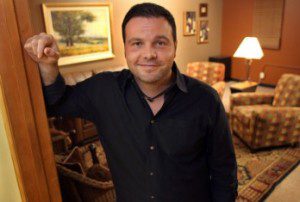Like many, I have been following the events at Mars Hill Church in Seattle with a mixture of emotions. Like many, I love Mark Driscoll and have learned a lot from him. I’ve been emboldened by him (from afar). I’ve reevaluated my identity as a man because of him. He’s instructed me (from afar) in cultural engagement and gospel-driven Christianity.
I want Mark and MHC to thrive. I’ve been to a Sunday service at the church, have visited Driscoll in his home, and have had him endorse the Jonathan Edwards books I cowrote with Douglas Sweeney. He’s only been kind and gracious to me, and I am deeply thankful for him. I did take note of a comment that Paul Tripp made two days in resigning from the Mars Hill Board of Advisors and Accountability. He said that over time,
it became clear to me that a distant, external accountability board can never work well because it isn’t a firsthand witness to the ongoing life and ministry of the church.
Such a board at best can provide financial accountability, but it will find it very difficult to provide the kind of hands-on spiritual direction and protection that every Christian pastor needs. Unwittingly what happens is that the external accountability board becomes an inadequate replacement for a biblically functioning internal elder board that is the way God designed his church to be lead and pastors to be guided and protected.
As some know, there has been a rollicking evangelical conversation on church polity the last few years. Yes, you read that right–“polity” and “rollicking” in the same sentence (perhaps for the first time ever?). The Bible requires us to put our doctrines together with care, and polity is no exception to this ideal. We need to be like the Bereans in Acts 17:11, and hold what we hold because Scripture teaches it and thus we cannot do otherwise (paraphrasing Luther at Worms).
I have written on this for 9Marks a few times, but I do not believe that evangelicals are free to essentially make up their own church government. I think that Scripture teaches that a body of elders should govern one body of believers in localized form. In other words, a group of men lead one church–by which I mean what we today call one “campus”–to shepherd the flock and present it holy and healthy to Christ. Texts like Acts 14:23 and Titus 1:5, showcasing the appointing of elders in every NT-era town where the gospel took root, point me in this direction, as do texts like 1 Timothy 3:1-7 and Titus 1:5-9, speaking as they do to the duties of elders who, it is expected, will oversee the congregation. There’s more to be said here, for sure; this is a start.
All of which leads us to modern polity. I find Tripp’s words of note: “a distant, external accountability board can never work well because it isn’t a firsthand witness to the ongoing life and ministry of the church.” I could not agree more. I am surprised that we might think that a church would work well with “distant, external accountability.” A church, after all, is not a business, or a non-profit, or a charity. A church is the body of Christ. It is a vital outpost of the kingdom of God. It’s a living thing. It’s much more like a coral reef, teeming with life, than it is a boat tied up on the dock, which you tune up a few times a year as a matter of routine maintenance.
People come to spiritual life in the church. People are guarded from Satan in the church. People are nourished and built up and edified and rebuked and corrected and trained and counseled in the church. The church isn’t about a weekly hour of preaching and singing. The church is fundamentally a whole-life reality. It keeps watch over your soul. More specifically, the elders keep watch over your soul. Think of Hebrews 13:17, which reads:
Obey your leaders and submit to them, for they are keeping watch over your souls, as those who will have to give an account. Let them do this with joy and not with groaning, for that would be of no advantage to you.
Here “leaders”–most likely elders–are pictured as providing spiritual oversight of the congregation. There’s a group of them, a team, it appears. They are not distant; they are not too harried by life to carry out this duty. They are commissioned for just this task: keeping watch.
We’re not even at the level of “which polity model do you choose?,” and yet the New Testament seems to speak pretty clearly: church leaders need to know their people. Period. Local church government, then, should definitely strive to fulfill this aim. It should seek to do so with excellence, with all diligence. This isn’t optional stuff. This isn’t stuff that elders outsource to others (though the whole flock cares for one another, to be sure). Elders as a plurality see their God-given mission as keeping watch, knowing their people, loving them.
It’s strange, because “community” is a modern buzz-word among evangelicals, and yet we seem to have trouble keeping our eye on one of the Bible’s simplest, plainest directives for creating God-exalting community: appointing elders who will lead the people well. I’m hopeful that in coming days, more evangelicals will turn to congregationalist polity, seeing the evidence for such a system in the DNA of the pastoral epistles (and Acts), and will no longer seek to come up with new models of church government.
Accountability boards might work great for corporations. But they and other forms of governance, however creative and well-intentioned, will not provide the soul-nourishing, spirit-stabilizing care that biblical polity will. Perhaps more young seminarians will see the wisdom of this path and will devote themselves to faithful performance of scriptural teaching over and against coming up with a newer, sleeker model.
The model of a plurality of elders, by the way, requires profound humility on the part of the elders involved. It is not conducive to what is today called “visionary” leadership of the pioneering, solo-virtuoso style. Too many seminarians and future pastors/planters have tremendous expectations placed on their shoulders. They’re called to be world-class innovators. Those who truly hit the mark in ministry, they soon learn from certain circles, are those who–like great business and organizational leaders–relentlessly innovate, transform, rethink, disrupt, deconstruct, and so on and so forth.
There are surely insights to be learned from business leadership–perhaps many. But fundamentally, the church is oriented to faithfulness, and congregational leadership is geared to humility. There is a big and strategic place in evangelicalism for bold, creative pioneers. We need them, and we benefit hugely from them. But the local church is less a start-up business and more a school of godliness.
I want pastors I train to be fearless for Christ. I also want them to exhibit profound humility. I think we’ve done well in recent years in recapturing a forward-moving spirit; I think we could do much better at training pastors to joyfully find their blueprint for faithful service in the Bible. Here’s hoping that happens in coming days, imperfect as we all are.
******************
Resource: the single-best accessible read on the kind of polity and church culture I’m sketching out here is this excellent article by Jonathan Leeman on the leadership of Mark Dever at Capitol Hill Baptist in Washington, D. C. I trained under Mark and saw just what Jonathan covers. If you’re a young gun looking for a model, unsure about the particulars of polity (as many of us are or were!), then consider this one. Think about the humility that such an approach calls for, and evaluate that based on your read of qualifications for leadership in the New Testament.
This won’t settle every ecclesiological issue, of course, but it might help.















